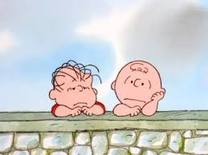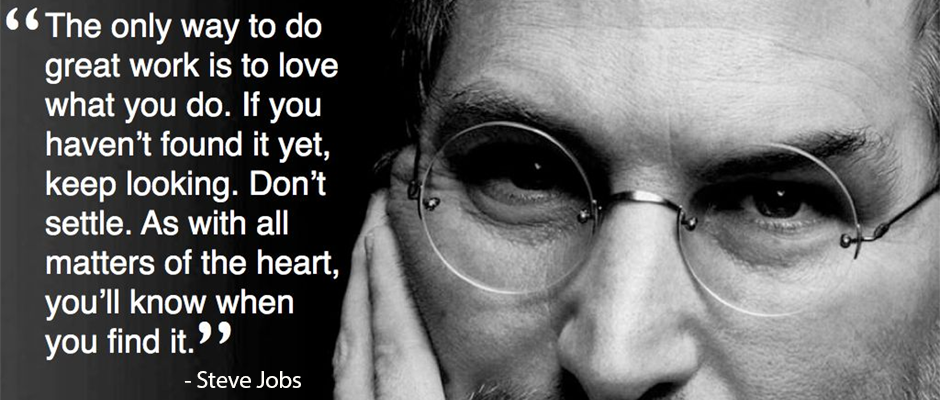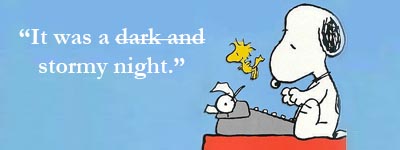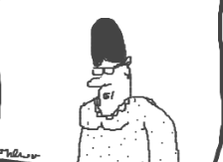
"I read Brian Tracy's No Excuses. I'm ready to put in two extra hours a day over what my job requires! I'm ready to vote myself off of 'Someday Island!' I'm ready to get to the top 20 percent in my field! I just need someone to recognize my desire and ambition and give me the right opportunity. The power is in the present, so that extra two hours is going to go toward carefully considered activities that will lead me to achieve my goal."
May 27
Update: So I was offered a position as an online writing tutor (I believe this is for college/graduate students). I haven't made a decision yet. I would get some very good paid training in online teaching -- training that I have considered paying for in the form of a college class. I'm still hoping for the job with capital "J" but this could only add to my skill set. If they answer my questions about the contract properly, then it probably makes sense to do it. Still hoping for the call from the place with the capital "J" comes in soon, but in the meantime I have to do what I can to move back into the "employed" category. As this is my first true "job hunt" in my life, (I think I mentioned before that great jobs used to just land in my lap as I made my way through college and graduate school). I am envisioning an analogy to actual hunting. I've been hunting -- successfully getting little rabbits and squirrels. I missed the mark on the big buck (no pun intended). And I'm wondering if I can gather up enough little rabbits to live on, but I I think not. I've got to keep on stalking the big game.
I copied and pasted these questions from Monster. Because I strongly suspect that some of my readers are now prospective employers, I figure I could save them some time by answering interview questions here. This information in written form might be just what a hiring manager may need to make a decision to move forward with a live interview or to move on to another candidate. Hopefully, before I hit question 100, I'll have landed the position that is the best fit for my employer and myself.
TELL ME ABOUT YOURSELF. There is quite a bit of honest me reflected in this website; it was not created to "sell myself" in order to achieve a career. It was initially created to sell my YA novel. I was told I must have a website to market my book, but it became more of a (barely) public journal.
I am a theatrical director, writer, and teacher. Theatre has been a huge part of my life and has led me to many wonderful opportunities including eight years with Clark Public Schools in New Jersey. If I were to be dropped down into a city where I know no one, I would have easy access to a new "family" just by getting involved in a theatrical production.
My most important position is that of teacher. The effect that teachers have on the lives of their students is often underestimated. When I look back on my years teaching, it is moments of real and honest discussion with students that I remember the most. In between sight-sound recognition for younger students, and literary elements for older ones, I have been privileged to glimpse authentic moments of self-discovery within my students. My teenagers are so surprised, sometimes, by the fact that I like them! Some of them are angry and "at-risk," doing all they can to make me oppose them, and they are utterly astonished when I can see the greatness in them. A teacher who cares for them in spite of the walls they put up can do miracles.
Public speaking, acting, directing, and teaching were learned skills for me. Writing was more like an instinct. I see this same compulsion in my daughter. She has to write. My teachers, college professors, and hours of reading helped to fine tune this skill, but one way or another I was destined to write. I am proud of my work; I feel like miracles can happen when my fingers are tapping away at the keyboard. That might be magical thinking, but it gives me a great deal of day to day satisfaction and that can only be of benefit to my life.
WHAT ARE YOUR STRENGTHS? Well, I'd like to say humility (I do consider that a strength), but that doesn't go over too well when I'm attempting to prove that I would be a good candidate for a job. I've got to toot my own horn, but I'm hoping for the day when I can put down that instrument! So, outside of humility, I guess it's time to brag a bit:
- I have a powerful work ethic. I believe that any task set before me should be completed with my best effort.
- I believe in the idea that "if you're not fifteen minutes early, you're late," philosophy attributed to Vince Lombardi.
- I am respectful of others and get along well with my colleagues.
- I have a sense of humor and an open mind.
- I have a pretty decent brain and I am a quick learner.
WHAT ARE YOUR WEAKNESSES? Being neat and organized does not come naturally to me. (I attribute this to being a right-brain dominant creative type). I have developed routines and procedures to address this problem. For example, in my eighth grade classroom students would often claim that they had handed in work that I couldn't find. I didn't trust my own organization skills, so I could be persuaded that I had lost their work. I developed a method in which all homework was placed by the student in a tray that was then clipped or stapled together. I learned very quickly that I wasn't losing students' work. They were trying to get away with something! Problem solved.
WHY DO YOU WANT THIS JOB? At the moment I am up for several positions, but I will only speak to the job that I really want which is an educational consultant for a certain company. I particularly want this job because I believe in the product. Education is my calling and my craft, but my life as a parent of a child with a learning disability has had greatly influenced my philosophy of education. This particular company has products that would have helped my son experience success in his elementary years had his school used them. The compensation I receive for my job is important, but no amount of money would be worth having to promote a program that I didn't believe in. I guess I am fortunate to be in a position to be picky about that.
WHERE WOULD YOU LIKE TO BE IN YOUR CAREER FIVE YEARS FROM NOW? I would like to be in a position where I am influencing the future of American education in a positive way. That could be in a small pond or on a large scale. I do have good ideas about the recipe for student success based upon my teaching years and my role as a parent. I have been in the trenches with kids of privilege and kids straight out of juvenile detention center. I know what works.
If my career were to take a turn toward writing (more or less exclusively) then my path would most certainly depend upon the company with which I work. For example, if my entry level position is about writing ad copy for an agency, then call me Peggy Olson! I am ambitious and I believe that my work ethic could lead to a position in which my leadership skills would be utilized.
WHAT'S YOUR IDEAL COMPANY? My ideal company is one in which the mission is to make the world a better place. I think leaders should be reasonable, thoughtful, and respectful of their employees and community around them. They should want to make a profit, of course, but that profit must be made via positive works. (Perhaps I can make it clear by saying that I would turn down any and all offers from tobacco companies or collection agencies).
WHY SHOULD I HIRE YOU? That's easy. I am at a point in my life where I am ready to focus on my career with laser precision. I know myself well, and I will only accept a position that suits me. Once I find that job, I will do my best with every given task whether it be leading a group through a complex project or writing a thank you note to a client.
WHAT DID YOU LIKE LEAST ABOUT YOUR LAST JOB? During my last four years of teaching, there were three superintendents. Every year the building principals and supervisors were moved or replaced. It was quite a change from the previous four years in which the leadership was stable. I never really got to know any of them, and I missed the relationships I had enjoyed with the experienced administration
WHEN WERE YOU MOST SATISFIED IN YOUR JOB? I wrote my master's thesis on boys with conduct disorder because I found great satisfaction in my ability to reach many of those students that others considered "spoilers." I'm very proud of that, and I believe that I really changed the lives of some of my "at-risk" students for the better. I actually heard that one of them became a teacher!
WHAT CAN YOU DO FOR US THAT THE OTHER CANDIDATES CAN'T? I cannot speak to what the other candidates can do. I only know that I am a good person with a strong work ethic and I am ready to step up and do my very best for you.
WHY ARE YOU LEAVING YOUR PRESENT JOB? At the moment, I teach just once a week and I get paid in barter credits for tuition (for my own children). I left my last full-time position because my children were very young and I believed that they would benefit from having a parent at home for a period of years. I did not want to juggle my career and very young children and do both a disservice. My children have gained a good deal of independence, and no longer need a parent to be present twenty-four hours a day. At this point, they quite appreciate my desire to move back into the workforce full time.
WHAT DO YOU KNOW ABOUT THIS INDUSTRY? I will have to assume that the industry in question is education. I might just be able to write a book about education, yet I wouldn't call myself an expert. There is always more to learn. Let me provide some bullet points of what I do know.
- In college, when I read John Dewey's turn-of-the-century writing on student-centered learning, I was shocked to find that it sounded very much like what some might consider a liberal "hippie" philosophy of education. I began to understand that many so-called "new" approaches to education are just part of a cycle in which old ideas are visited anew.
- Strong classroom management skills are vital to successful teaching. Without them, teachers are in for decades of misery, or more likely a necessary career change.
- Positive strategies like those in Lee Canter's Assertive Discipline should be part of every teacher training program.
- When politicians with no classroom or administrative experience make policy about education, they usually do harm.
- Data is important, but not everything needs to be data driven.
- Teachers often influence the moral direction of a child (consciously or unconsciously).
- Sometimes school just needs to be fun!
- Taking a child's elective away in order to drill basic skills (due to a poor test score) will make the school his enemy.
- A great lesson is one that the student must prepare for in the same way that a teacher would. For example, having a role in a literature circle puts the responsibility on the student to become an expert on the given text. This type of approach is immensely satisfying to to the students and the teacher.
- When a teacher uses an approach that combines caring, high expectations, humor, and assertive discipline, most "emotionally disturbed" children have the potential to become valuable classroom members. I have found the exception to this rule is rare and in my career has only happened in the case of two students -- one who became psychotic and completely out of touch with reality, and the other who is a sociopath (he is currently incarcerated).
- Teachers don't need an IEP to intelligently implement modifications and alternative assessments.
- Modifications (e.g. a scribe or voice recognition software for a student with dysgraphia) do not give the student an unfair advantage. They simply create a level playing field.
- Sadly, some parents do not have their children's best interests at heart. An intelligent educator will be sensitive to clues about the motivations of parents.
- Parents don't always have an objective view of their children's strengths and weaknesses.
- Teachers are mandated reporters of suspected child abuse.
- Grade inflation has put teachers in a difficult position. Narratives are better reflections of a student's effort and achievement than a letter grade or score.
The most important opportunities to go beyond the call of duty usually happen outside of the data driven curriculum and present themselves as life lessons to my students. One situation I can think of happened during field day. There was a commotion within a group of students and I walked up to find one student being berated by another. I quickly moved in and removed the victim of the verbal attack. We found a place to talk and she told me a complicated and personal story. It was very gratifying to be able to help her understand the situation and go on to make better choices in the future. She was so appreciative that I spoke to her honestly, realistically, and without judgment. As teachers, we see our students in many contexts. We are often called to do more than simply deliver an inspiring lesson.
CAN YOU DESCRIBE A TIME WHEN YOUR WORK WAS CRITICIZED? When I worked as a content writer for a company that sells interactive learning products, my job was to put my best effort forth to supply essays that would serve as models for developing writers. Instead of the usual flattering comments I had received from college professors, I virtually always had to rewrite everything! It was a new experience, and I was surprised, but the solution was simple: take the criticism and make the changes. I perused her comments very carefully and responded to them completely. Then... I was published!
If I were involved in a more high stakes, long-term project with him, I would assertively address the problem. In this case, I would most likely attempt to define for him exactly what he could do in the hopes that specificity would motivate him to action.
If I were his boss, I would make sure that he understood the task at hand. If he did not, I would either give him direct guidance or ask other members of the group to do so. Once it was clear that he understood the task at hand, I would say, "What is your role here? What are you doing to contribute to the group?"
DO YOU HAVE ANY QUESTIONS FOR ME? This is a highly company specific question, but I do not underestimate the momentous influence that the company for which I work will have upon my life. For me, that company will be much more than a place in which to clock in my hours and collect my paycheck. It will be a good portion of my identity, my social life, and the means by which I contribute value (I hope) to society.
Because I don't have a specific company or institution in mind, I will simply supply the question that ran through my head when I first saw the prompt: "What would a typical day be like? What would I do, mostly, from the time I enter the building (or alternatively, begin working offsite) to the time I end my work day?"





 RSS Feed
RSS Feed
